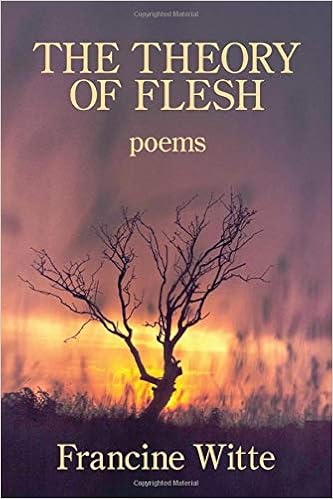 Reviewed by Charles Rammelkamp
Reviewed by Charles Rammelkamp
The Theory of Flesh
by Francine Witte
Kelsay Books
2019, $16.00, 78 pages, ISBN: 978-1950462278
The Theory of Flesh states that “it’s up to you / to give your flesh what it’s asking / for.” The pursuit of happiness. Go for it! Only, so much is out of our control. “How the Trouble Started” clues us in, in case we had any doubts: “The ocean licked the land, and that’s / when man crawled out, two-legged / fish with opposable thumbs, fashioning tools.” Like a scientist of existential torment, with a Ph.D. in Angst Studies, Francine Witte spells out the origins of regret, heartbreak and loss in this comprehensive, tender collection of poems.
Fittingly, the collection begins, Darwin-like, with “Evolution.”
First, the ape,
paw-digits poking
at sticks. Monkeybrain
seemed to want
a fire.
The results are anti-climactic, a little disappointing, to tell the truth, as we learn later on in the poem:
Now there’s us.
Filthy with fires
and bloated with words.
We are scorched with war,
and we say nothing.
Witte fits the human drama into the larger cosmic order, a bigger bang. In “I Look to the North” she writes:
And maybe the earth is turning adult,
and one day soon, it will be meeting
the other planets for coffee, all of them
heaving a sigh of relief about the rash
of humans the earth used to have.
Particularly in the second section of the book, Witte also gets into the weeds of human relationships, where the rubber of The Theory of Flesh meets the road, where theory meets evidence. In poem after poem we meet people who likewise develop, evolve, just as the universe does, but whose hearts get broken along the way nevertheless, as they strive to give the flesh what it’s looking for. In poems like “A Stranger Shows Up, and He Looks Just Like You,” “Questionnaire,” “So When Michael Says Goodbye,” “The Night He Left Me for Another Woman,” “After the Movie” and ”We Sit at the Corner Table” Witte shows us the sad end of love, the suffering it leaves in its wake. “Love // has a lifeline, blips and ticks and then plain / flat,” she writes in “A Stranger Shows Up…” When Michael says goodbye? “this time he means it. / No more calling you late at night, / half-drunk and horny.” And they sit at that corner table
because no one needs to see the end
of love. To the untrained eye, we are
romance, a cuddle of arms and shoulders
tucked off to the side, our love bunched
up in the restaurant’s elbow. But it’s not
an elbow, it’s more of a closing fist….
Other poems are equally heartbreaking takes on human frailty and plain dumb luck. In “Bad Enough,” a woman’s husband cheats on her with an underage girl whose father “now gone / booze crazy” has disowned his daughter, and when the straying husband and the girl drown in an accident, “would later send me the bill for his daughter’s / burial.” Salt in the wounds! In “How the Car Was in Neutral,” a mother leaves her baby strapped into the carseat for just a second to wipe birdshit off the windshield, when the car suddenly starts to roll, unstoppable, with tragic results. As in a horror movie, Witte makes us feel the mother’s frantic behavior:
How the wiper blade
would snap as the dinosaur weight
began to build, what she would later
tell the grief counselor was like death
winning an arm wrestle. How all the time, the baby
was strapped in good and tight….
“Two Old Sisters” shows us how the rivalry between two siblings persists through time, even when it no longer matters. “The two old sisters sitting now / by a window. Evened out by age. // The secrets they are still holding / on to, covering them like a shawl.”
Divided into three sections, the poems in the third, as in the first, expand to the larger, general context of human existence, poems like “Grief” (“is a slow eat / through the dirt.”); “Doubt” (“Maybe you are the same / amount of alive when you are asleep as when / you are running a marathon.”); “Dogs Know” (“Dogs know, but they can’t tell you. / We are the ones with speech. / Stupid irony.”); “11:59” (“But here you are / face to face with need, the spices on the wallrack // eyeing you like a jury. You think in this space / before tomorrow that you shouldn’t have to explain / yourself anymore.”).
This poem, “11:59,” which is about insomnia, begins “when you sleepstumble into the late / night kitchen….” Witte’s invention of words like “sleepstumble” is one of the true joys of her poetry. We’ve already seen “paw-digits” and “Monkeybrain” above, but others can be found in “Forgetting You Is Like a Lion,” which begins “pawhappy and swatting…” and in “Exactly How Many Me’s Are There?” where she writes about her mother, “I teenager-ed myself / away from her.”
To sum it all up, the penultimate poem in this wonderful collection, entitled “Thirst,” ends:
And every night
we realize, how exactly the same we have become
older than our whole lives, younger only than our death.
About the reviewer: Charles Rammelkamp is Prose Editor for BrickHouse Books in Baltimore and Reviews Editor for The Adirondack Review. A chapbook of poems, Jack Tar’s Lady Parts, is available from Main Street Rag Publishing. Another poetry chapbook, Me and Sal Paradise, was recently published by FutureCycle Press. An e-chapbook has also recently been published online Time Is on My Side (yes it is). Another chapbook, Mortal Coil, is forthcoming from Clare Songbirds Publishing.